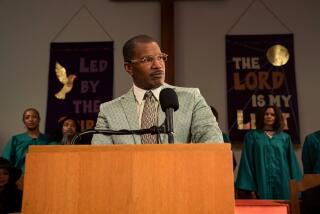Review: ‘The Banker,’ starring Anthony Mackie and Samuel L. Jackson, eventually earns its keep
“The Banker,” starring Anthony Mackie and Samuel L. Jackson as real estate businessmen, is both the kind of story we need more of, and too often the type of film we get way too much of — airless, cookie-cutter prestige entertainment. And yet as director George Nolfi unravels a fascinating real-life-inspired case from the mid-20th century of financial gamesmanship that also busted an impasse for black business, the narrative ultimately satisfies — in much the way “Hidden Figures” overcame regrettable filmmaking choices — as an inspiring curiosity from the unknown history of those who combated racial discrimination.
(Apple had originally planned to release “The Banker” for awards consideration last year, but in the wake of allegations against one of its producers — whose name has since been removed from the credits — they postponed its rollout until now.)
We first meet Bernard Garrett (later played by Mackie) as a shoeshine boy in 1939 outside the main bank of small-town Willis, Texas, listening to his customers talk finance, taking notes after they leave, and eavesdropping on meetings from outside the window. Dad (Gregory Alan Williams) knows his kid is brilliant and ambitious but worries white America will never accept him as such.
The young math whiz grows up to be a financial wizard and successful building owner but sees greater potential in Los Angeles, moving there in 1954 with wife Eunice (Nia Long) to fulfill his dream of owning real estate in white neighborhoods that he can renovate and integrate. To get around the unspoken ban on selling to people who look like him, he partners with an Irish businessman (Colm Meaney) who agrees to be the white face of their deals. When circumstance and prejudice prove that arrangement’s undoing, Garrett thinks bigger — and perhaps vengefully — by figuring out how to buy downtown L.A.’s tallest commercial building (the old Bankers Building), which would turn the exclusionary banking institutions inside it into his tenants.
Teaming with a flashy, canny nightclub owner named Joe Morris (Jackson) as a co-investor, the pair train a young working-class acquaintance named Matt Steiner (Nicholas Hoult) to be their white frontman. In no time, Garrett and Morris assemble a real estate and banking empire, albeit one in which their involvement often has to be concealed to be effective.
Nolfi does his own crafty sell job, too, with this material, presenting the rise of Garrett and Morris — which eventually leads them to Texas and a more complicated and risky plan to buy Garrett’s hometown bank — as a de facto heist movie, complete with planning montages (centered on Steiner’s golf and math lessons), jaunty scheming music, sneaky adversary (Scott Daniel Johnson as a suspicious bank colleague), and even disguises when the spiffily-attired Morris and Garrett are required to dress as chauffeurs and janitors to hide in plain sight and be within earshot of Steiner’s nervous role-playing.
As inspired as this caper-ish take is, Nolfi, who wrote “Ocean’s Twelve” and is a credited screenwriter on “The Banker” with Niceole Levy, David Lewis Smith and Stan Younger, is unfortunately no Steven Soderbergh when mixing genre and genuineness into a total package. Until the halfway point, “The Banker” is a real mishmash of period blandness, trite dialogue, dull compositions and choppy scenes, with Mackie looking stiff, Long straining at the thanklessness of a supporting wife role, and Jackson pushing too hard with Morris’ cigars-and-sharkskin rascaliness.
The second hour is a livelier playing ground for the actors — and even more mathy, considering how financial maneuvers play into the suspense. (Cap rates, valuing methodologies and loan packages are discussed with the urgency of war strategies.) It’s those larger threads, though, of privilege, civil rights, racism and sexism, not to mention how the federal government’s involvement brought things to a head, that really do their part here in cementing what these savvy entrepreneurs tried to do in getting black citizens long denied access to capital and, therefore, a true shot at the American dream. For good stretches, “The Banker” can be as dryly engineered as a loan application, but the galvanizing story it tells — like a last stand of rebel ingenuity before the Fair Housing Act of 1968 made discrimination unlawful — is a solid interest-earner.
'The Banker'
Rated: PG-13, for some strong language including a sexual reference and racial epithets, as well as smoking throughout
Running time: 2 hours
Playing: Starts March 6, iPic Westwood; iPic Pasadena; Regency, Rancho Niguel; available March 20 on Apple TV+
More to Read
Only good movies
Get the Indie Focus newsletter, Mark Olsen's weekly guide to the world of cinema.
You may occasionally receive promotional content from the Los Angeles Times.










